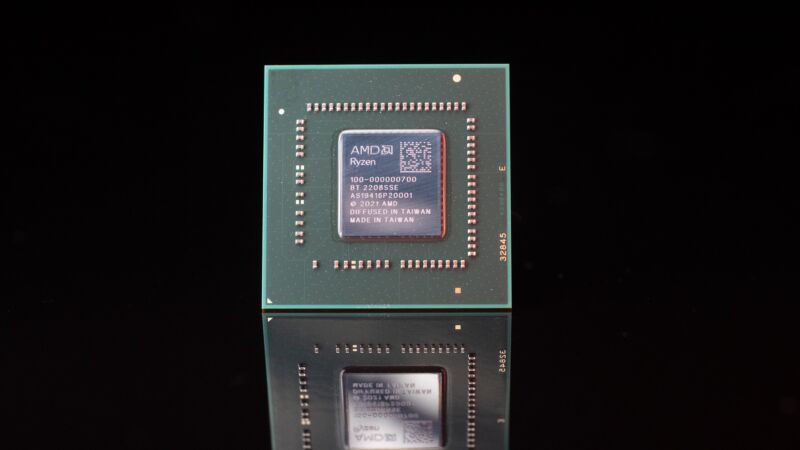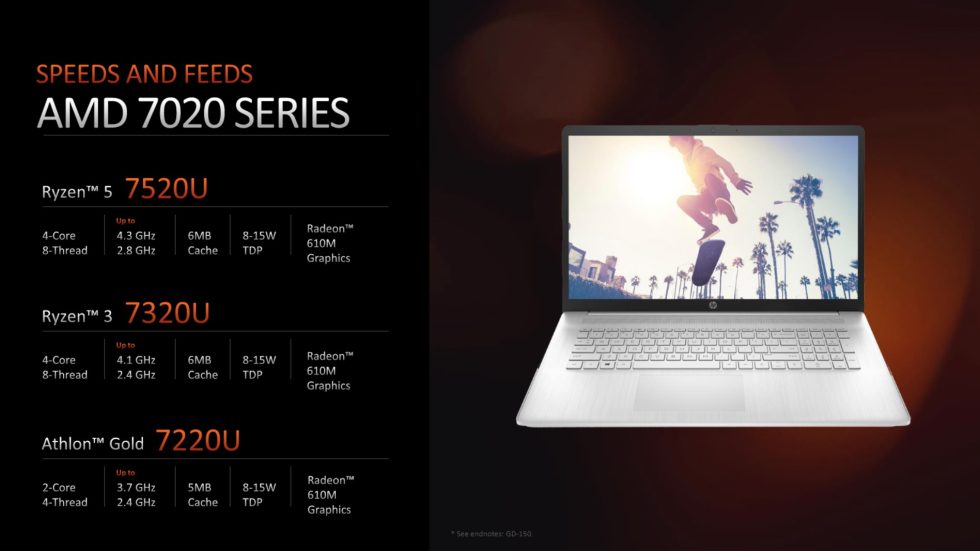

AMD’s first Ryzen 7000 mobile CPU is a mix of old and new for midrange laptops
source link: https://arstechnica.com/gadgets/2022/09/amds-first-ryzen-7000-mobile-cpu-is-a-mix-of-old-and-new-for-midrange-laptops/
Go to the source link to view the article. You can view the picture content, updated content and better typesetting reading experience. If the link is broken, please click the button below to view the snapshot at that time.

everything old is new again —
AMD’s first Ryzen 7000 mobile CPU is a mix of old and new for midrange laptops
It won't be an impressive performer, but it could still be a budget contender.
Andrew Cunningham - 9/20/2022, 1:00 PM

At Computex earlier this year, AMD announced a processor called "Mendocino" that was intended to bring modern technology and 12-hour battery life to laptops in the unexciting-but-important $400 to $700 price range. Today, the company is bringing Mendocino to market in the form of three Athlon and Ryzen processors, collectively dubbed the 7020 series. AMD says laptops with these Mendocino-based processors will be available starting in Q4 of 2022, which is nearly upon us; launch systems include Lenovo's IdeaPad 1, Acer's Aspire 3, and a 17-inch laptop from HP.
The processor in the 7020 series is its least interesting element. It's a quad-core, eight-thread CPU (in the Ryzen chips; the Athlon chip is dual-core) based on 2019's Zen 2 architecture, previously seen in 3000-series Ryzen desktop processors and 4000- and 5000-series mobile processors. A Zen 2 CPU should be fast enough to make most basic browsing and office apps feel snappy, and they'll be preferable to the likes of Intel's Pentium and Celeron Silver chips (and probably also many of the upcoming Intel Processors). But they'll be slower than many 5000-series and 6000-series Ryzen CPUs, as well as quad-core-or-better, 11th-gen-and-up Core CPUs from Intel.
All 7020-series CPUs include a new GPU based on AMD's RDNA2 GPU architecture, which is also found in its Radeon RX 6000-series graphics cards, Ryzen 6000-series laptop processors, and the upcoming Ryzen 7000 desktop processors. AMD is including four of its graphics compute units (CUs) with every 7020-series CPU in a GPU that it has dubbed the Radeon 610M. That's one-third as many GPU cores as it includes in high-end Ryzen 6000 parts, but they should still be sufficient for very light gaming—AMD's press materials mention 720p gaming in competitive games like League of Legends, CS:GO, and DOTA 2.
AdvertisementDepending on the laptop's port selection, the GPU can also drive up to four displays simultaneously, including the built-in display panel. And as RDNA2 GPUs, they get the same video encoding and decoding support as higher-end models do, including decode support for the AV1 codec.
Like the Ryzen 6000 processors, these Mendocino chips are built using a 6 nm process from TSMC, and they also require LPDDR5 memory—in the near-term, mandating pricier DDR5 memory seems antithetical to low-priced laptops, but all kinds of DDR5 RAM should steadily get cheaper over the next year or two as more devices support it and manufacturing ramps up. The processors also include Microsoft Pluton security hardware.
The Mendocino CPUs are our first glimpse of AMD's new laptop processor naming scheme in action. The "7" at the beginning of the number simply denotes that AMD is including it as part of its 2023 processor lineup, while the "2" in the third digit indicates that it is using the Zen 2 processor architecture. The second digit will range from 2 for the low-end, dual-core Athlon Gold 7220U all the way up to 5 for the quad-core Ryzen 5 7520U, with the quad-core Ryzen 3 7320U in between the two.
Promoted Comments
-
nehinks wrote:I don't need the very highest end laptop chip (which usually is power hungry and hot), but is there any advantage to having Zen 2 (rather than 3) that I'm unaware of? Not a fan of this approach.Using Zen 3 would make a better product, but it would require more design work than Zen 2. Zen 3 is based on an 8 core chiplet, Zen 2 a 4 core chiplet. If you're targeting 4 cores anyway for budgetary reasons this approach makes a lot of sense.
There is nothing ideal about this product, AMD is very focused on the high end with their primary products. This exists at all because it was easy and low risk.
Recommend
About Joyk
Aggregate valuable and interesting links.
Joyk means Joy of geeK
